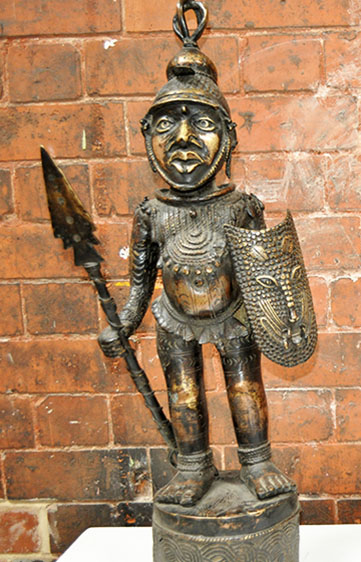125 years ago, thousands of plaques and sculptures that decorated the royal palace of the Kingdom of Benin in what is now Edo State, Nigeria were looted by British soldiers during the Benin Expedition of 1897. This expedition was intended to consolidate imperial control over Southern Nigeria.
These looted treasures are collectively known as the ‘Benin bronzes’, although a variety of materials were used in their construction. They were created from the thirteenth century onwards by artists of the Edo people
This picture in the article is not of the artifacts in British museums

Picture of an ancient warrior
For many years, the Nigerian government has been requesting that the bronzes be returned to their homeland, on the grounds that they are stolen property of huge cultural significance to Nigeria. On the weekend, the Horniman Museum in London announced that it would return 72 objects to Nigeria, including 12 bronzes, following a process of consultation with key stakeholders. The museum’s chair said, "The evidence is very clear that these objects were acquired through force, and external consultation supported our view that it is both moral and appropriate to return their ownership to Nigeria.” The museum’s decision comes in the wake of similar actions by the Great North Museum, Aberdeen University and Jesus College, Cambridge. In the USA, the Metropolitan Museum of Art and the Smithsonian recently agreed to return their looted artefacts to Nigeria. Perhaps most significantly of all, on 1 July this year, the German government announced that it would return around 1100 artefacts from several institutions.
It seems, then, that there is a groundswell of support for the return of the looted Benin artifacts to Nigeria. However, there is one very conspicuous exception. The British Museum holds over 900 of these objects, the largest collection in the world. Its website acknowledges that the objects were acquired in the process of ‘widespread destruction and pillage by British forces.’ It recognises that the bronzes were ‘key historic records for the Benin Court and kingdom, enabling illustration of historic practices and traditions.’ It goes on to report the request for their return by the Nigerian government and concludes by emphasising the Museum’s commitment to ‘engagement’ and ‘dialogue’ and to a future permanent exhibition in Benin City that will feature some of the Museum’s artefacts, presumably on loan. Its website is silent about returning the artefacts, but the Museum has said separately that it is prevented from permanently returning items by the British Museum Act and the National Heritage Act.
Of course, there is a principle here that goes far beyond the Benin bronzes. Many museums have exhibits of dubious provenance, and many where we know they were stolen, often during colonial times. They are visible and tangible reminders of the violence that was perpetrated in their countries of origin, and the disregard that was displayed for the history and culture of those countries.
It would be hugely significant symbolically if the British museum were to join the movement to return these artefacts; a key step in the righting of historic wrongs. Perhaps now is the time for that to happen, even if it requires an amendment to the law.




